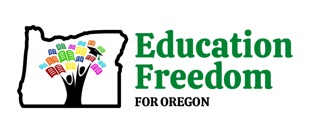Education Freedom, a series on “Why School Choice”
Editors note: This is the second in a five-part series on School Choice Initiatives aimed for the November 2024 election ballot.
School choice isn't a Republican vs. Democrat battle.
IP 5 and
IP 6 is a "parents know their children and know which learning environment their children need," according to chief petitioner Donna Kreitzberg.
School choice increases parents’ involvement in their children’s education, according to an
AEI Research report. In an evaluation of the D.C.’s school choice, Opportunity Scholarship Program (OSP), researchers detailed dramatic increases in parental involvement. They reported, “Our research suggests that one of the most positive consequences of the OSP is that parental involvement with their child’s education has increased. Parents of high school, middle school and elementary students across both cohorts in the first and second year of the OSP emphatically stated that their parental involvement had dramatically increased when their children entered the OSP program.” This especially held true for low-income families that did not own a home or car. “This realization suggested that most OSP parents were essentially moving from the margins to the center of their children’s academic development.”
Chief petitioner Kreitzberg, lists some of the reasons parents have for wanting education options:
- child needs to go faster at his own pace,
- child is bullied,
- child wants more hands on and less computer,
- child wants part in class and part at home,
- parents want their child in a school that doesn't close for strikes,
- parents want their child at a school closer to parent's work or babysitter,
- parents need a school with before & after school options,
- parents want a school that shares the same vision on age-appropriate books & curricula,
- parents want a safer school with a zero-tolerance violence policy,
- parents want a school with smaller class sizes,
- parents want a school that welcomes parent involvement in the classroom,
- parents want the options applied to one of their children to apply to their other children. And those options could apply for a few years and then changed.
School choice is not a private vs public school issue either. One parent expressed satisfaction with his son’s public school, until the lockdown came. His son did not do well with a self-discipline internet program and quickly fell behind. To keep up he learned how to game the program. Recognizing his son wasn’t learning anything, he was financially able to enroll him in private school where he is excelling. But not every one was financially able to take their child out of a failing situation and reeducation has contributed to behavioral problems.
Another parent’s son dropped out of high school in fear of all the violence allowed to take place without consequences. He was fortunate to find a private high school with an opening where his son could finish and graduate.
A D V E R T I S E M E N T

A D V E R T I S E M E N T
The Heritage Foundation reported that school choice options can help students escape communities where bullying, gang related violence, or other school violence is common. This was proven in research that found school choice participants were half as likely to commit felonies and misdemeanors as those who went to their local public school.
Abigail Shrier, researcher and best-selling author warns parents that current school policies are not your friend. In an
interview with Glen Beck she says when they tell a parent to have the mental health expert talk to your kid, they aren’t your friend either. The last epidemic was encouraged by school counselors. That’s what they are told to do, affirm a child transgender identity and deceive parents. The school policy was, and still is in many places, to lie to the parents. Contributing is the social-emotional learning exercise that refers to parents as caregivers and outsiders and the trusted adults are the teachers and counselors. The effort to undermine parent-child relationships is real. Australia and UK peer review research studies both proved that the coping techniques taught the student to dwell from their negative self, which for a child revolves around the person responsible for them – their parent becomes the focus of their trauma. The study showed it made them sadder, more anxious, and more alienated from their parents.
Kreitzberg says, “With a robust school choice program, public schools have the opportunity and incentive to respond--many begin to listen more to parents' concerns at school board meetings and deliver a product that serves the students better. Just like in any industry, public schools will adapt and compete for students. Public schools can choose to shape their school culture or personality to what appeals to parents and students in their area--STEM, music, technology, outdoorsy, etc.”
For more information,
Education Freedom for Oregon website has information about the petitions, events on gathering signatures, and print and mail petitions.
--Donna Bleiler| Post Date: 2024-03-21 13:23:01 | Last Update: 2024-03-20 22:19:50 |







